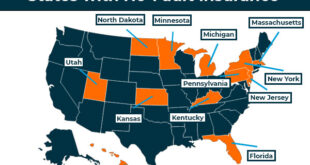Comprehensive Auto Insurance: Know Before Choosing the Best Policy What Is Comprehensive Auto Insurance? Comprehensive auto insurance is a type of car insurance coverage that protects against damages not caused by collisions. It covers incidents like theft, vandalism, natural disasters, fire, and falling objects. While it is not legally required like liability insurance, it is often mandated by lenders if you have a car loan or lease.
How Does Comprehensive Auto Insurance Work?
Comprehensive coverage kicks in when your car is damaged due to non-collision events. If you file a claim, you typically pay a deductible, and the insurance company covers the rest of the repair or replacement costs, up to the vehicle’s actual cash value (ACV).
For example, if a hailstorm damages your car, you would file a claim, pay the deductible (e.g., $500), and your insurer would cover the remaining repair costs.
What Does Comprehensive Auto Insurance Cover?
Comprehensive auto insurance covers a variety of risks, including:
- Theft: If your car is stolen, your insurer will reimburse you for its market value.
- Vandalism: Covers damage from graffiti, key scratches, or broken windows.
- Fire and Explosions: If your vehicle is damaged by fire, it’s covered.
- Natural Disasters: Protection against hurricanes, floods, earthquakes, and tornadoes.
- Falling Objects: Covers damage from tree branches, rocks, or debris.
- Animal Collisions: If you hit a deer or other animal, repairs are covered.
- Glass Damage: Covers cracked or shattered windshields.
What Is Not Covered by Comprehensive Auto Insurance?
Comprehensive coverage does not include:
- Damage from car accidents (covered by collision insurance).
- Injuries to you or others (covered by medical payments or liability insurance).
- Damage to another person’s car (covered by liability insurance).
- Mechanical breakdowns or wear and tear.
Comprehensive vs. Collision Insurance: What’s the Difference?
Both comprehensive and collision insurance cover vehicle damage, but they apply in different situations:
Many drivers opt for both to ensure full protection.
Do You Need Comprehensive Auto Insurance?
Comprehensive insurance is beneficial for many drivers, but it may not be necessary in every situation. Consider getting comprehensive coverage if:
- You lease or finance your car (your lender may require it).
- You live in an area prone to theft, vandalism, or natural disasters.
- Your car is relatively new or expensive to repair.
However, if your car is old and not worth much, the cost of comprehensive coverage might outweigh the potential payout.
How Much Does Comprehensive Auto Insurance Cost?
The cost of comprehensive auto insurance depends on several factors, including:
- Vehicle Value: Expensive cars cost more to insure.
- Location: Urban areas with higher theft rates have higher premiums.
- Deductible Choice: Higher deductibles lower premiums but increase out-of-pocket costs.
- Driving Record: A clean record can lower insurance rates.
On average, comprehensive insurance costs between $100 to $300 per year, but rates vary widely based on the above factors.
How to File a Comprehensive Insurance Claim
If you experience a covered loss, follow these steps:
- Assess the Damage: Take photos and document what happened.
- Contact Your Insurer: Report the incident as soon as possible.
- Provide Necessary Documents: Submit a police report (if required) and any supporting evidence.
- Get an Estimate: Your insurer will assess the damage and estimate repair costs.
- Pay the Deductible: Once approved, you pay your deductible, and the insurer covers the rest.
10 Essential Tips for Choosing the Right Comprehensive Auto Insurance
- Compare Multiple Providers: Get quotes from at least three insurance companies.
- Check Customer Reviews: Read reviews to gauge customer satisfaction.
- Understand the Deductible: Choose a deductible that balances affordability and coverage.
- Know Your Vehicle’s Value: Ensure the coverage is appropriate for your car’s worth.
- Bundle Policies: Combining auto and home insurance can save money.
- Look for Discounts: Insurers offer discounts for safe driving, anti-theft devices, and multiple vehicles.
- Review Policy Exclusions: Know what’s covered and what isn’t.
- Consider Your Location: If you live in a high-risk area, comprehensive coverage is essential.
- Assess Your Financial Situation: If you can’t afford unexpected repairs, comprehensive coverage is a smart choice.
- Read the Fine Print: Make sure you fully understand the policy before purchasing.
10 Frequently Asked Questions (FAQs)
- Is comprehensive auto insurance required by law?
No, but lenders may require it if you finance or lease your car. - Can I get comprehensive insurance without collision coverage?
Yes, you can purchase comprehensive insurance separately. - Does comprehensive insurance cover rental cars?
It depends on your policy—some insurers extend coverage to rentals. - Will my insurance pay if my car is stolen?
Yes, if you have comprehensive coverage, your insurer will pay the car’s ACV. - Does comprehensive coverage include roadside assistance?
No, roadside assistance is usually a separate add-on. - How does my deductible affect my premium?
A higher deductible lowers your premium but increases out-of-pocket expenses. - Does comprehensive insurance cover flood damage?
Yes, flood damage is included in comprehensive coverage. - Can I cancel comprehensive insurance anytime?
Yes, but if you have a loan or lease, your lender may require it. - Is comprehensive insurance worth it for an old car?
It depends on the car’s value—if it’s low, you may not need comprehensive coverage. - How do I lower my comprehensive insurance costs?
Choose a higher deductible, bundle policies, and maintain a clean driving record.
Conclusion
Comprehensive auto insurance provides essential protection against theft, vandalism, natural disasters, and other non-collision-related damages. While not legally required, it is often necessary for those with financed or leased vehicles.
Choosing the right policy requires careful consideration of your car’s value, location, and risk factors. By comparing providers, understanding coverage details, and selecting the right deductible, you can secure a policy that offers financial protection and peace of mind.
 Gerbang Finance
Gerbang Finance

